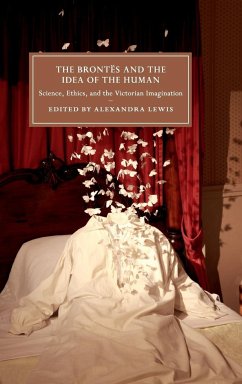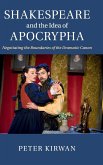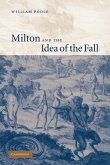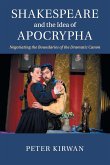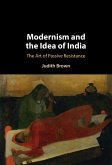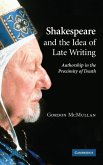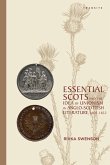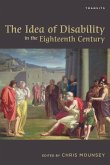The Brontës and the Idea of the Human
Herausgeber: Lewis, Alexandra
The Brontës and the Idea of the Human
Herausgeber: Lewis, Alexandra
- Gebundenes Buch
- Merkliste
- Auf die Merkliste
- Bewerten Bewerten
- Teilen
- Produkt teilen
- Produkterinnerung
- Produkterinnerung
Investigates the idea of the human within Brontë sisters' work, offering new insight on their writing and cultural contexts.
Andere Kunden interessierten sich auch für
![Shakespeare and the Idea of Apocrypha Shakespeare and the Idea of Apocrypha]() Peter KirwanShakespeare and the Idea of Apocrypha110,99 €
Peter KirwanShakespeare and the Idea of Apocrypha110,99 €![Milton and the Idea of the Fall Milton and the Idea of the Fall]() William PooleMilton and the Idea of the Fall52,99 €
William PooleMilton and the Idea of the Fall52,99 €![Shakespeare and the Idea of Apocrypha Shakespeare and the Idea of Apocrypha]() Peter KirwanShakespeare and the Idea of Apocrypha42,99 €
Peter KirwanShakespeare and the Idea of Apocrypha42,99 €![Modernism and the Idea of India Modernism and the Idea of India]() Judith BrownModernism and the Idea of India107,99 €
Judith BrownModernism and the Idea of India107,99 €![Shakespeare Idea of Late Writing Shakespeare Idea of Late Writing]() Gordon McMullanShakespeare Idea of Late Writing118,99 €
Gordon McMullanShakespeare Idea of Late Writing118,99 €![Essential Scots and the Idea of Unionism in Anglo-Scottish Literature, 1603-1832 Essential Scots and the Idea of Unionism in Anglo-Scottish Literature, 1603-1832]() Rivka SwensonEssential Scots and the Idea of Unionism in Anglo-Scottish Literature, 1603-183260,99 €
Rivka SwensonEssential Scots and the Idea of Unionism in Anglo-Scottish Literature, 1603-183260,99 €![Idea of Disability in the Eighteenth Century Idea of Disability in the Eighteenth Century]() Idea of Disability in the Eighteenth Century57,99 €
Idea of Disability in the Eighteenth Century57,99 €-
-
-
Investigates the idea of the human within Brontë sisters' work, offering new insight on their writing and cultural contexts.
Produktdetails
- Produktdetails
- Verlag: Cambridge University Press
- Seitenzahl: 314
- Erscheinungstermin: 26. April 2019
- Englisch
- Abmessung: 235mm x 157mm x 21mm
- Gewicht: 608g
- ISBN-13: 9781107154810
- ISBN-10: 1107154812
- Artikelnr.: 53170040
- Herstellerkennzeichnung
- Libri GmbH
- Europaallee 1
- 36244 Bad Hersfeld
- gpsr@libri.de
- Verlag: Cambridge University Press
- Seitenzahl: 314
- Erscheinungstermin: 26. April 2019
- Englisch
- Abmessung: 235mm x 157mm x 21mm
- Gewicht: 608g
- ISBN-13: 9781107154810
- ISBN-10: 1107154812
- Artikelnr.: 53170040
- Herstellerkennzeichnung
- Libri GmbH
- Europaallee 1
- 36244 Bad Hersfeld
- gpsr@libri.de
Introduction: human subjects: reimagining the Brontës for
twenty-first-century scholarship Alexandra Lewis; 1. Hanging, crushing, and
shooting: animals, violence and child-rearing in Brontë fiction Sally
Shuttleworth; 2. Learning to imagine Dinah Birch; 3. Charlotte Brontë and
the science of the imagination Janis McLarren Caldwell; 4. Being human:
de-gendering mental anxiety; or hysteria, hypochondriasis, and traumatic
memory in Charlotte Brontë's Villette Alexandra Lewis; 5. Charlotte Brontë
and the listening reader Helen Groth; 6. Burning art and political
resistance: Anne Brontë's radical imaginary of wives, slaves, and animals
in The Tenant of Wildfell Hall Deborah Denenholz Morse; 7. Degraded nature:
Wuthering Heights and the last poems of Emily Brontë Helen Small; 8.
'Angels ... recognize our innocence': on theology and 'human rights' in the
fiction of the Brontës Jan-Melissa Schramm; 9. 'A strange change
approaching': ontology, reconciliation, and eschatology in Wuthering
Heights Simon Marsden; 10. 'Surely some oracle has been with me': women's
prophecy and ethical rebuke in poems by Charlotte, Emily and Anne Brontë
Rebecca Styler; 11. Jane Eyre, a teaching experiment Isobel Armstrong; 12.
Fiction as critique: postcripts to Jane Eyre and Villette Barbara Hardy;
13. We are three sisters: the lives of the Brontës as a Chekhovian play
Blake Morrison.
twenty-first-century scholarship Alexandra Lewis; 1. Hanging, crushing, and
shooting: animals, violence and child-rearing in Brontë fiction Sally
Shuttleworth; 2. Learning to imagine Dinah Birch; 3. Charlotte Brontë and
the science of the imagination Janis McLarren Caldwell; 4. Being human:
de-gendering mental anxiety; or hysteria, hypochondriasis, and traumatic
memory in Charlotte Brontë's Villette Alexandra Lewis; 5. Charlotte Brontë
and the listening reader Helen Groth; 6. Burning art and political
resistance: Anne Brontë's radical imaginary of wives, slaves, and animals
in The Tenant of Wildfell Hall Deborah Denenholz Morse; 7. Degraded nature:
Wuthering Heights and the last poems of Emily Brontë Helen Small; 8.
'Angels ... recognize our innocence': on theology and 'human rights' in the
fiction of the Brontës Jan-Melissa Schramm; 9. 'A strange change
approaching': ontology, reconciliation, and eschatology in Wuthering
Heights Simon Marsden; 10. 'Surely some oracle has been with me': women's
prophecy and ethical rebuke in poems by Charlotte, Emily and Anne Brontë
Rebecca Styler; 11. Jane Eyre, a teaching experiment Isobel Armstrong; 12.
Fiction as critique: postcripts to Jane Eyre and Villette Barbara Hardy;
13. We are three sisters: the lives of the Brontës as a Chekhovian play
Blake Morrison.
Introduction: human subjects: reimagining the Brontës for
twenty-first-century scholarship Alexandra Lewis; 1. Hanging, crushing, and
shooting: animals, violence and child-rearing in Brontë fiction Sally
Shuttleworth; 2. Learning to imagine Dinah Birch; 3. Charlotte Brontë and
the science of the imagination Janis McLarren Caldwell; 4. Being human:
de-gendering mental anxiety; or hysteria, hypochondriasis, and traumatic
memory in Charlotte Brontë's Villette Alexandra Lewis; 5. Charlotte Brontë
and the listening reader Helen Groth; 6. Burning art and political
resistance: Anne Brontë's radical imaginary of wives, slaves, and animals
in The Tenant of Wildfell Hall Deborah Denenholz Morse; 7. Degraded nature:
Wuthering Heights and the last poems of Emily Brontë Helen Small; 8.
'Angels ... recognize our innocence': on theology and 'human rights' in the
fiction of the Brontës Jan-Melissa Schramm; 9. 'A strange change
approaching': ontology, reconciliation, and eschatology in Wuthering
Heights Simon Marsden; 10. 'Surely some oracle has been with me': women's
prophecy and ethical rebuke in poems by Charlotte, Emily and Anne Brontë
Rebecca Styler; 11. Jane Eyre, a teaching experiment Isobel Armstrong; 12.
Fiction as critique: postcripts to Jane Eyre and Villette Barbara Hardy;
13. We are three sisters: the lives of the Brontës as a Chekhovian play
Blake Morrison.
twenty-first-century scholarship Alexandra Lewis; 1. Hanging, crushing, and
shooting: animals, violence and child-rearing in Brontë fiction Sally
Shuttleworth; 2. Learning to imagine Dinah Birch; 3. Charlotte Brontë and
the science of the imagination Janis McLarren Caldwell; 4. Being human:
de-gendering mental anxiety; or hysteria, hypochondriasis, and traumatic
memory in Charlotte Brontë's Villette Alexandra Lewis; 5. Charlotte Brontë
and the listening reader Helen Groth; 6. Burning art and political
resistance: Anne Brontë's radical imaginary of wives, slaves, and animals
in The Tenant of Wildfell Hall Deborah Denenholz Morse; 7. Degraded nature:
Wuthering Heights and the last poems of Emily Brontë Helen Small; 8.
'Angels ... recognize our innocence': on theology and 'human rights' in the
fiction of the Brontës Jan-Melissa Schramm; 9. 'A strange change
approaching': ontology, reconciliation, and eschatology in Wuthering
Heights Simon Marsden; 10. 'Surely some oracle has been with me': women's
prophecy and ethical rebuke in poems by Charlotte, Emily and Anne Brontë
Rebecca Styler; 11. Jane Eyre, a teaching experiment Isobel Armstrong; 12.
Fiction as critique: postcripts to Jane Eyre and Villette Barbara Hardy;
13. We are three sisters: the lives of the Brontës as a Chekhovian play
Blake Morrison.

